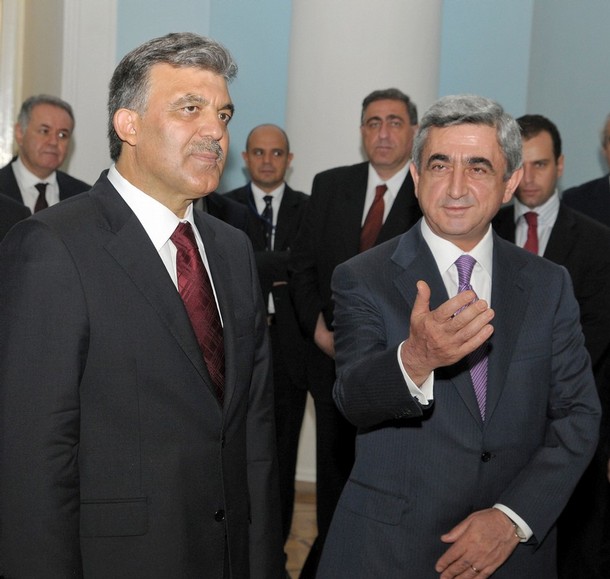What Is in Our Best Interest: Yerevan and the Genocide

Armenians hold up large banners reading “Recognition, Reparations, Restitution” during the Armenia v. Turkey soccer match in September, 2008
Since its independence, Armenia has seldom had the time or the opportunity to dabble in international politics. The extent to which it has been involved has had to do primarily with the war for the independence of Artsakh and, its dealings with France, Russia, and the United States in establishing the terms for a definitive end to the conflict. Otherwise, Armenia’s involvement within the international framework has been limited to cooperation with European standards of governance, attempts at Western-oriented societal and legal refinements, and activities within the Commonwealth of Independent States (CIS).
President Serzh Sarkissian strongly deviated from this posture when he invited Turkey’s president, Abdullah Gul, to Armenia, to watch a World Cup qualifying soccer match between the two countries. It was an active diplomatic effort that gained the praise of some and the disapprobation of others. More importantly, it came with an implicit assertion: that Armenia was now willing to undertake greater objectives with regard to its foreign policy.
Heretofore, Armenian-related issues were largely within the purview of Diaspora communities in their adopted countries around the world. From Armenian Genocide recognition to economic and military aid for Armenia to Artsakh’s right to self-determination, Diasporan organizations – like the Armenian National Committee – became adept at fighting for causes that affected not only the Armenians in their own communities but Armenians throughout the world. Expectedly, the Diaspora has become an indispensable part of foreign policymaking that affects Armenia. Noting this, among other considerations, a Ministry of the Diaspora was established, also under President Sarkissian’s administration. This was an important step in fortifying the established goals of the both the Republic of Armenia and the Armenian Diaspora.
Concerning one of these points in particular – the Armenian Genocide – Yerevan should be conscious of the much larger role it can play than it already has.
The stated policy of the Republic is that it demands the recognition of the Genocide by Turkey. As a country in the international system, Armenia is part of apparatuses that allow it to bring forth the Armenian Genocide issue in myriad arenas. For example, it is wholly capable of vigorously objecting the Turkish government’s attempts to silence any discussion about the Genocide within the United Nations. As a member of the UN, the freedom to express itself is Armenia’s right – one that Turkey has no qualms about using – and one that Armenia should feel similarly, and unabashedly, comfortable with.

Turkish President Abdullah Gul and Armenian President Serzh Sarkissian meet in Yerevan in September, 2008
Further, it is incumbent upon Armenia to actively demand that Turkey recognize the Armenian Genocide. This may seem as a simple enough gesture but one that it seems the government in Yerevan has shied away from in the face of diplomatic concerns. The reality is that Turkey closed its border with Armenia 16 years ago for no reason other than an apparent attempt to suffocate its neighbor to the east and make it doubly difficult for its citizens to survive. Unsurprisingly, Armenians once again withstood a vile test of their tenacity and have progressed significantly while eastern Turkey remains a derelict landmass, ignored even by its own government. Thus, when Prime Minister Tayyip Erdogan puts preconditions on the amelioration of relations with the Armenian government – such as dropping the pursuit of recognition, reparations, and restitution – Yerevan must respond with equal force and publicly reaffirm its conviction to attain justice for the 1.5 million Armenians who were slaughtered at the hands of Ottoman Turks.
In reemphasizing its efforts, the Armenian government can utilize the newly established Ministry of the Diaspora to communicate and coordinate with those who understand, through decades of experience, the foreign governments Armenia is now dealing with. Likewise, Armenia’s vocal support of Diasporan endeavors in foreign countries would undoubtedly be a boon to those activities. It ought to also be willing to explain the reasoning behind overtures such as those made to Turkey, which have yet to become elucidated by any government official. In that vein, Armenia should emphasize to PM Erdogan that fully normalized relations will be impossible until Turkey acknowledges the truths of its history and remedies the injustices that befell the Armenians in Anatolia as they experienced one of the worst horrors of human history.
There is no place for timidity in world politics and the decades-long struggle of the Diaspora must now be met with commensurate zeal on the part of the independent Republic of Armenia. Having weathered a war, an earthquake, and closed borders for much of its existence, the Third Republic must be supremely confident of its ability to manage complex situations. It cannot and must not be afraid to assert itself on the world stage and it must swiftly respond to the purposeful falsification of its history with vigor. Succinctly, Armenia must be forward, frank, and fastidious in its pursuit of justice for the victims and survivors of the Armenian Genocide at every juncture – it is, indeed, its duty.


Leave a Reply
Want to join the discussion?Feel free to contribute!